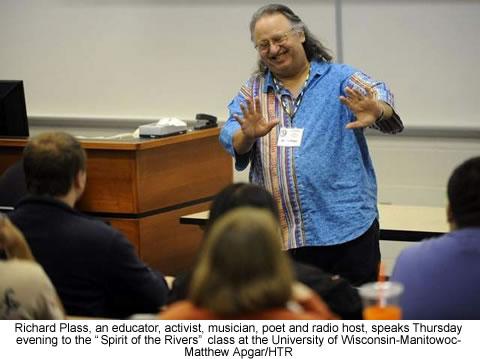 |
Canku Ota
|
 |
|
(Many Paths)
|
||
|
An Online Newsletter
Celebrating Native America
|
||
|
November
1, 2011 - Volume 9 Number 11
|
||
|
|
||
|
Firsthand Account
|
||
|
by Cindy Hodgson - Herald
Times Reporter
|
||
 MANITOWOC
— More than 40 years later, Native American Richard Plass still
tells the story of what happened at a basketball game in Kaukauna
when he was a senior at Shawano High School. He told it again Thursday
evening when he spoke to an interdisciplinary class called "Spirit
of the Rivers" at the University of Wisconsin-Manitowoc. MANITOWOC
— More than 40 years later, Native American Richard Plass still
tells the story of what happened at a basketball game in Kaukauna
when he was a senior at Shawano High School. He told it again Thursday
evening when he spoke to an interdisciplinary class called "Spirit
of the Rivers" at the University of Wisconsin-Manitowoc.
Plass, a Menominee/Stockbridge-Munsee, was president of his
class when school personnel asked him to dress up in his traditional
attire and lead the school's basketball team, the Shawano Indians,
onto the court before a game. He was resistant and explained, "We don't do that stuff
for show; we do it for a specific purpose." But they asked
him to talk to his parents, who asked him to talk with people on
the reservation. A tribal leader told him if they wanted a show,
he should give them a show, as long as he didn't wear anything considered
sacred. Plass didn't know what kind of reception he would get but was
pleased to have the crowd stand and applaud when he ran onto the
court. Afterward, the principal assumed he would do it again the
next week, and after some hesitation, he was persuaded. He received
the same applause. The following week the game was in Kaukauna. When told the Kaukauna
principal had sent a letter expressing eagerness for him to participate,
Plass again agreed. This time there was a much different response.
Unlike on his home turf, where many Native Americans were in attendance,
the crowd in Kaukauna laughed at him, called him names, threw things
and spit on him. "I went running in the locker room in tears," Plass
said. His school received a letter of apology from the Kaukauna principal,
which Plass said was "cool" but "still don't take
away what happened." Fast-forward a few decades. Plass was taking his young grandsons
to a restaurant in Green Bay when they saw a banner on a nearby
school that said, "Kill the Indians." His 7-year-old grandson
wanted to know why people wanted to kill them, and Plass tried to
explain it was just a sports thing, that nobody wanted to kill them.
His grandson still didn't understand, and Plass didn't know how
to answer. Mishicot IndiansThe presentation by Plass was one of three components
of a program called "Native Americans in the Media" that
was open to the public for a fee through UW-Manitowoc's continuing
education program. The other components were a showing of the film "Reel Injun"
and an exhibit called "Bittersweet Winds" featuring a
variety of items Plass has collected that illustrate how Native
Americans have been depicted. One of the depictions Plass objects to is the use of Indian
names, logos and mascots by sports teams, such as the Mishicot Indians.
He said people tell him he should be honored. "Three people today told me that," he said. But he doesn't feel honored. "There is no honor in being laughed at, having food thrown
on you or being spit on," he said. Plass acknowledged that the Potawatomi in Hannahville, Mich.,
have given their approval for Mishicot to use the Indians as their
mascot, and members of Chief Mishicott's family — after whom
Mishicot is named — used to come to the community to do exhibitions.
But he said they're from Michigan, not Wisconsin, and no tribe in
Wisconsin approves of the use of Indian mascots and logos by sports
teams. Patty Marquardt of Manitowoc was one of the community members
in attendance. She said she has developed an interest in history,
specifically pertaining to Native Americans, and when she finds
an event on the topic, she tries to attend and become more informed. Marquardt also is a graduate of Mishicot High School, and she
said she opposes using Indians as the team mascot. She said she
wanted to hear from a Native American who is offended by its use,
so she has "ammunition" in her conversations about the
topic; she found his presentation "so helpful." Many people haven't heard that side of the issue, said Kerry
Trask, who co-teaches the class with Laura Apfelbeck. He thought
it was good for people to hear from "a traditional Menominee
person." It's hard to look Plass in the eye and think that Indian mascots are OK, Apfelbeck said. |
|
|
||
|
|
||
| Canku Ota is a free Newsletter celebrating Native America, its traditions and accomplishments . We do not provide subscriber or visitor names to anyone. Some articles presented in Canku Ota may contain copyright material. We have received appropriate permissions for republishing any articles. Material appearing here is distributed without profit or monetary gain to those who have expressed an interest. This is in accordance with Title 17 U.S.C. Section 107. | ||
|
Canku Ota is a copyright ©
2000, 2001, 2002, 2003, 2004, 2005, 2006, 2007, 2008, 2009, 2010,
2011 of Vicki Barry and Paul Barry.
|
||
 |
 |
|
|
The "Canku
Ota - A Newsletter Celebrating Native America" web site and
its design is the
|
||
|
Copyright ©
1999, 2000, 2001, 2002, 2003, 2004, 2005,
2006, 2007, 2008, 2009, 2010, 2011
of Paul C. Barry.
|
||
|
All Rights Reserved.
|
||